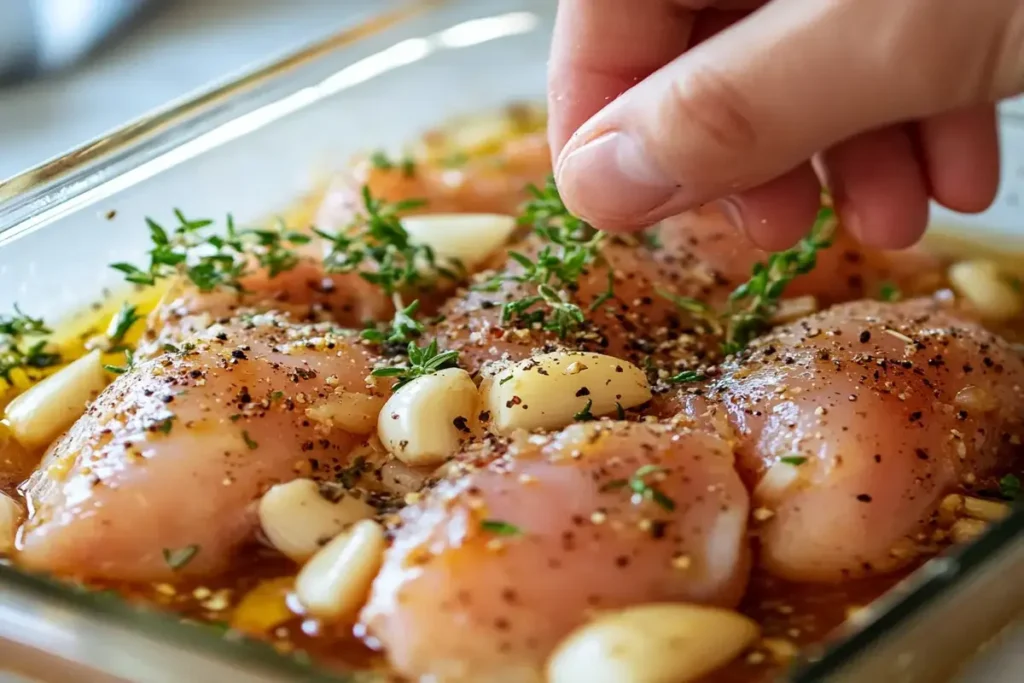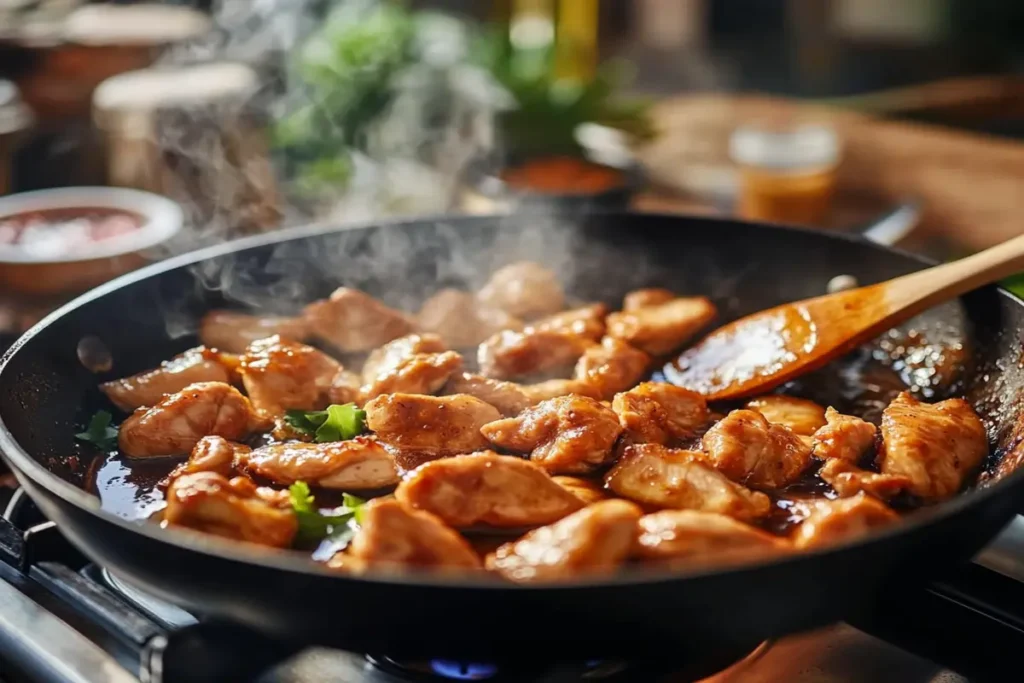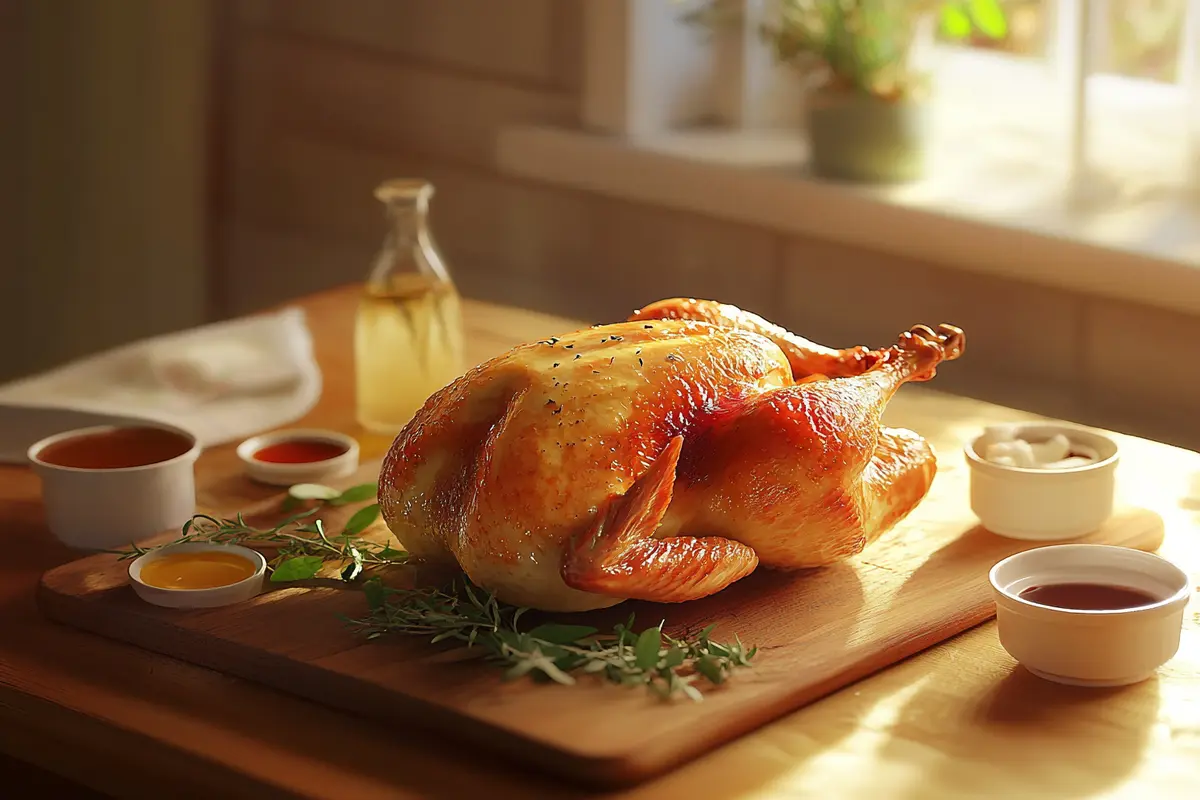Vinegar is a versatile ingredient that plays a pivotal role in enhancing the texture, flavor, and safety of chicken dishes. Understanding how vinegar interacts with chicken can elevate your culinary skills and add depth to your recipes.
Tenderizing Chicken with Vinegar
Acidic Properties: Breaking Down Proteins
Vinegar’s acidity helps break down the proteins in chicken, making it tender and juicy. When marinating chicken, the acidic nature of vinegar disrupts the protein structure, which:
- Softens the muscle fibers.
- Reduces toughness in larger cuts of meat.
- Prepares the chicken for better flavor absorption.
This process works best when vinegar is paired with complementary ingredients, such as oils and herbs, to balance its strong acidic punch.
Enhancing Moisture Retention in Chicken
Another benefit of vinegar is its ability to help chicken retain moisture during cooking. By altering the proteins’ structure, vinegar allows the meat to hold onto water, reducing the risk of dryness. Whether you’re grilling, roasting, or frying chicken, a quick vinegar-based marinade ensures a succulent final product.
Flavor Infusion Through Marination
How Vinegar Adds Tangy Depth to Chicken
Vinegar not only tenderizes but also infuses chicken with a tangy depth of flavor. Its sharp, vibrant notes can:
- Highlight the natural flavors of the chicken.
- Complement a variety of spices and herbs.
- Balance rich or fatty ingredients, such as cream or butter.
A vinegar-based marinade can transform a simple chicken breast into a culinary masterpiece by creating layers of flavor.
Popular Types of Vinegar for Chicken Recipes
Different types of vinegar offer unique flavor profiles, making them ideal for various chicken recipes:
- White Vinegar: Neutral and versatile, often used in basic marinades.
- Apple Cider Vinegar: Slightly sweet and fruity, perfect for grilled or baked chicken.
- Balsamic Vinegar: Rich and sweet, great for glazed or roasted dishes.
- Rice Vinegar: Mild and subtly sweet, commonly used in Asian-inspired recipes.
Each vinegar type brings distinct characteristics, enhancing the overall flavor profile of the dish.
Vinegar as a Cleaning Agent for Chicken

Debunking Myths: Does Vinegar Really Clean Chicken?
While many believe vinegar “cleans” chicken, the truth is more nuanced. Vinegar can:
- Help remove surface bacteria, although cooking at proper temperatures is more effective.
- Eliminate strong odors from raw chicken.
- Serve as a rinse to remove sliminess.
However, it’s important to note that vinegar should not replace proper hygiene practices, such as thoroughly washing hands and cleaning surfaces.
Safety Precautions When Using Vinegar in Cooking
When using vinegar in your chicken recipes, consider the following safety tips:
- Avoid over-marinating chicken in vinegar, as the acidity can make the meat mushy.
- Rinse chicken lightly after a vinegar soak to remove excess acidity.
- Ensure vinegar is properly diluted in marinades to balance its intensity.
Using vinegar thoughtfully ensures both safety and optimal flavor in your cooking.
Balsamic Vinegar and Its Culinary Applications
Balsamic vinegar is a culinary gem known for its sweet and tangy flavor profile and versatility in cooking. Whether used as a glaze or in its pure form, balsamic vinegar transforms simple dishes into gourmet delights.
What is the Difference Between Balsamic Glaze and Balsamic Vinegar?

Understanding the differences between balsamic glaze and vinegar is key to using them effectively in the kitchen. Both are derived from the same base ingredient but serve different purposes:
- Balsamic Vinegar: A liquid with a thin consistency, used for marinating, dressing, and deglazing.
- Balsamic Glaze: A reduced, syrupy version of balsamic vinegar, ideal for drizzling and garnishing.
Each has unique characteristics that lend themselves to specific culinary applications.
Balsamic Vinegar Basics
Traditional vs. Modern Balsamic Vinegar Production
Balsamic vinegar production varies significantly between traditional and modern methods:
- Traditional Production:
- Made from Trebbiano or Lambrusco grapes.
- Aged for years in wooden barrels to develop complex flavors.
- Certified as “Aceto Balsamico Tradizionale” and often more expensive.
- Modern Production:
- Made by combining grape must with wine vinegar.
- May include caramel or other additives for quicker flavor development.
- More affordable and widely available.
Traditional balsamic vinegar offers a richer taste, while modern varieties are versatile for everyday cooking.
Sweetness and Acidity Levels: Key Differences
Balsamic vinegar is known for its balance of sweetness and acidity. Traditional balsamic tends to be sweeter due to prolonged aging, while modern versions are sharper with higher acidity. This balance makes balsamic ideal for both sweet and savory recipes.
Understanding Balsamic Glaze
Reduced Consistency: What Makes Glaze Different
Balsamic glaze is essentially a concentrated version of balsamic vinegar:
- How It’s Made:
- Balsamic vinegar is simmered until it reduces to a thick, syrupy consistency.
- Sometimes sweeteners like honey or brown sugar are added for extra richness.
- Flavor Profile:
- Intense sweetness with a subtle tang, making it perfect for drizzling over dishes.
This reduction process amplifies the flavors, turning balsamic glaze into a versatile finishing touch.
Typical Uses of Balsamic Glaze in Cooking
Balsamic glaze shines as a garnish or finishing element. Common uses include:
- Drizzling over salads, such as Caprese, for a burst of flavor.
- Enhancing roasted vegetables, like Brussels sprouts or carrots.
- Pairing with fruits, such as strawberries, for a unique dessert twist.
- Glazing meats like chicken, pork, or duck for a glossy, caramelized finish.
Its thick consistency makes it easy to create visual appeal on plates.
Balsamic Vinegar in Cooking
What Does Balsamic Vinegar Do in Cooking?
Balsamic vinegar brings depth to dishes by adding:
- A sweet-tangy balance that enhances savory ingredients.
- Complexity to sauces, dressings, and reductions.
- Acidity that brightens flavors and tenderizes meats.
Its versatility makes it a staple in many cuisines, from Italian to contemporary fusion.
Balancing Sweet and Savory Dishes with Balsamic
The beauty of balsamic vinegar lies in its ability to harmonize sweet and savory flavors:
- Add a splash to sautéed onions for a caramelized touch.
- Use it in barbecue sauce for a tangy contrast.
- Mix it with honey or maple syrup for glazes that complement roasted proteins.
Pro tip: Pair balsamic vinegar with ingredients like garlic, olive oil, or Dijon mustard to create balanced marinades and dressings.
Popular Recipes Featuring Balsamic Vinegar
Some crowd-pleasing recipes include:
- Balsamic Chicken: Chicken breasts marinated in balsamic vinegar, garlic, and herbs, then grilled or baked to perfection.
- Balsamic Reduction Sauce: A concentrated sauce for drizzling over steaks or fish.
- Strawberry Balsamic Salad: Fresh strawberries, spinach, goat cheese, and pecans dressed with balsamic vinaigrette.
These dishes highlight balsamic vinegar’s versatility and its ability to enhance a wide range of flavors.
Questions About Chickens and Balsamic Vinegar
The relationship between chickens and balsamic vinegar might seem unconventional, but it’s a topic of interest for those exploring the dietary impacts and culinary uses of vinegar in poultry. This section dives into whether balsamic vinegar is safe for chickens, its effects, and alternatives to consider.
Can Chickens Eat Balsamic Vinegar?
Effects of Balsamic Vinegar on Chickens
Balsamic vinegar, though flavorful for humans, may not be the best additive for chicken diets. Here’s why:
- Digestive Challenges:
- Chickens have a sensitive digestive system that may not tolerate the acidity of balsamic vinegar well.
- Acidic substances can cause irritation or upset stomachs in poultry.
- Potential Benefits:
- In controlled amounts, vinegar may aid in balancing gut pH levels.
- Some studies suggest mild vinegar use in water can promote better digestion, but balsamic’s sweetness and acidity make it less ideal compared to other vinegar types.
Nutritional Considerations: Is It Safe for Chickens?
When assessing the safety of balsamic vinegar for chickens, consider the following:
- Sugar Content:
- Balsamic vinegar contains higher natural sugars compared to other vinegar types, which could disrupt a chicken’s dietary balance.
- Acidity:
- The acidity might help with some bacterial control in water but could harm if overused.
- Alternative Choices:
- Apple cider vinegar is often recommended for chickens instead, as it offers digestive benefits with less sweetness.
Alternatives and Precautions
Natural Additives for Chicken Feed
If you’re looking to enhance your chicken’s diet or overall health, here are safer, natural additives:
- Apple Cider Vinegar (ACV):
- Popular among poultry farmers for improving gut health.
- Mix 1 teaspoon per liter of water to avoid over-acidifying.
- Garlic:
- Acts as a natural antibacterial and may boost immunity.
- Herbs:
- Oregano and thyme can support a healthy digestive system and act as mild natural antibiotics.
What to Avoid in a Chicken’s Diet
Some foods and substances are harmful to chickens and should always be avoided:
- Processed Vinegars:
- Avoid balsamic vinegar with added sugars or artificial flavors.
- Stick to organic, unfiltered vinegars if needed.
- Foods High in Salt or Fat:
- Chickens do not process high-fat or salty foods well, leading to health complications.
- Avocado:
- The pit and skin contain persin, which is toxic to chickens.
- Chocolate or Caffeine:
- These are highly toxic and can cause immediate health issues.
Conclusion
While balsamic vinegar adds flavor and complexity to human dishes, it’s not an ideal choice for chicken diets due to its high sugar content and acidity. For optimal poultry health, stick to natural, well-tested additives like apple cider vinegar, garlic, and herbs. When it comes to incorporating vinegar into your cooking, however, balsamic remains a top choice for enhancing both sweet and savory dishes.
If you have further questions about balsamic vinegar or how to use it safely in culinary or agricultural settings, don’t hesitate to ask!


1 thought on “The Role of Vinegar in Cooking Chicken”